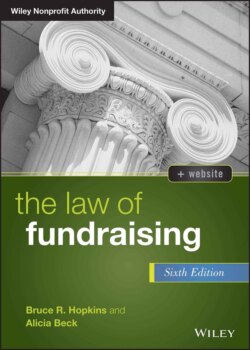Читать книгу The Law of Fundraising - Bruce R. Hopkins - Страница 82
§ 3.13 PROHIBITED ACTS
ОглавлениеNearly all of the state charitable solicitation acts contain a list of one or more types of conduct—often termed prohibited acts—that may not be lawfully engaged in by a charitable organization (and perhaps a professional fundraiser, professional solicitor, and/or commercial coventurer).
These prohibited acts may entail some or all of the following:
A person may not, for the purpose of soliciting charitable contributions, use the name of another person (except that of an officer, director, or trustee of the charitable organization by or for which contributions are solicited) without the consent of the other person.69 This prohibition extends to the use of an individual's name on stationery or in an advertisement or brochure, or as one who has contributed to, sponsored, or endorsed the organization.
A person may not, for the purpose of soliciting contributions, use a name, symbol, or statement so closely related or similar to that used by another charitable organization or government agency that it would tend to confuse or mislead the public.70
A person may not use or exploit the fact of registration with the state to lead the public to believe that the registration in any manner constitutes an endorsement or approval by the state.
A person may not misrepresent to or mislead anyone, by any manner, means, practice, or device, to believe that the organization on behalf of which the solicitation is being conducted is a charitable organization or that the proceeds of the solicitation will be used for charitable purposes, where that is not the case.
A person may not represent that the solicitation is for or on behalf of a charitable organization or otherwise induce contributions from the public without proper authorization from the charitable organization.71
Some states prohibit a professional solicitor from soliciting for a charitable organization unless the solicitor has a written and otherwise valid authorization from the organization, has the authorization in his or her possession when making solicitations, and displays the authorization upon request to the person being solicited, police officers, or agents of the state.
